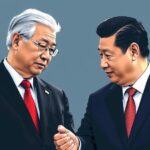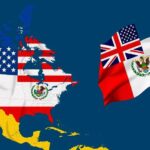Politics
ARTIFICIAL INTELLIGENCE, ASIA, BBC NEWS, BIDEN ADMINISTRATION, CHATGPT, CHINA, CNBC, DAVID SACKS, DEEPSEEK, DONALD TRUMP, ETHICS, FOX NEWS, KA, KAROLINE LEAVITT, LEAVITT, MEXICO, NATIONAL SECURITY, NATIONAL SECURITY COUNCIL, NAVY, NORTH AMERICA, OPENAI, SACKS, U. S, UNITED STATES, US, US NAVY, US-CHINA RELATIONS, WHITE HOUSE
Omar El-Sharif
DeepSeek’s AI Breakthrough Sparks US National Security Concerns
DeepSeek, a Chinese AI firm, is under scrutiny from US national security officials following its recent advancements, which caused a decline in US tech stocks. The US Navy has banned its members from using DeepSeek’s applications due to security concerns. Amidst this, DeepSeek claims to be facing cyberattacks while OpenAI aims to guard its technology against competitors.
The recent advancements in artificial intelligence (AI) by the Chinese firm DeepSeek have drawn the attention of US national security officials, as noted by White House Press Secretary Karoline Leavitt. The United States Navy has issued a ban on DeepSeek’s applications due to perceived security and ethical concerns. This follows revelations that DeepSeek’s AI model has disrupted US technology stocks, prompting scrutiny over the substantial investments made by American technology companies in AI development.
Leavitt reported that the National Security Council is actively investigating the potential national security implications arising from DeepSeek’s breakthroughs, which have raised alarms within the US tech sector. President Donald Trump highlighted DeepSeek’s emergence as a significant concern, labeling it a wake-up call for the industry. Reports indicate that the Navy has advised personnel against using DeepSeek’s software amidst these rising concerns.
David Sacks, the newly appointed White House AI and Crypto Czar, suggested that DeepSeek may have benefited from knowledge distillation techniques involving models created by OpenAI, a leading US AI firm. He indicated that the government might prompt domestic AI firms to implement protective measures against similar practices in the future. OpenAI corroborated this assertion, emphasizing the ongoing attempts by non-US companies to replicate their AI models.
Amid these developments, DeepSeek announced they have been targeted by multiple cyberattacks, necessitating temporary registration limits for their software. Reports emanating from state-controlled media in China claim that cyberattacks have increased in intensity, contributing to operational challenges for the firm. The sudden popularity of DeepSeek’s AI model has affected US tech stocks, which have seen a brief decline, revealing the competitive nature of the AI market.
Despite the rise of DeepSeek, analysts maintain that the United States retains an advantage in AI development due to its leading chip manufacturers and established infrastructure. Trump’s analysis reflects optimism, suggesting that cost-effective advancements could ultimately benefit the US technology landscape. He expressed confidence in maintaining the country’s leadership in the field, emphasizing that a lower-cost alternative is still advantageous although concerns remain over national security and ethical implications surrounding foreign AI developments.
DeepSeek’s recent rise in the AI sector and its resultant impact on US markets has significant implications for national security. US officials are now closely monitoring the situation, particularly in light of reports indicating that DeepSeek’s AI solutions may utilize methods that give them a competitive edge over American firms. This situation is compounded by the existing tension between the US and China regarding technological advancements, data security, and ethical operations in AI.
In conclusion, DeepSeek’s advancements have raised serious national security concerns within the United States, prompting investigations and responses from governmental agencies and the tech industry. The implications of these developments could redefine competition in the AI market, necessitating stronger oversight and protective measures for US intellectual property. The situation remains fluid, with ongoing vigilance required to address ethical and security challenges posed by foreign advancements in technology.
Original Source: www.bbc.com








Post Comment